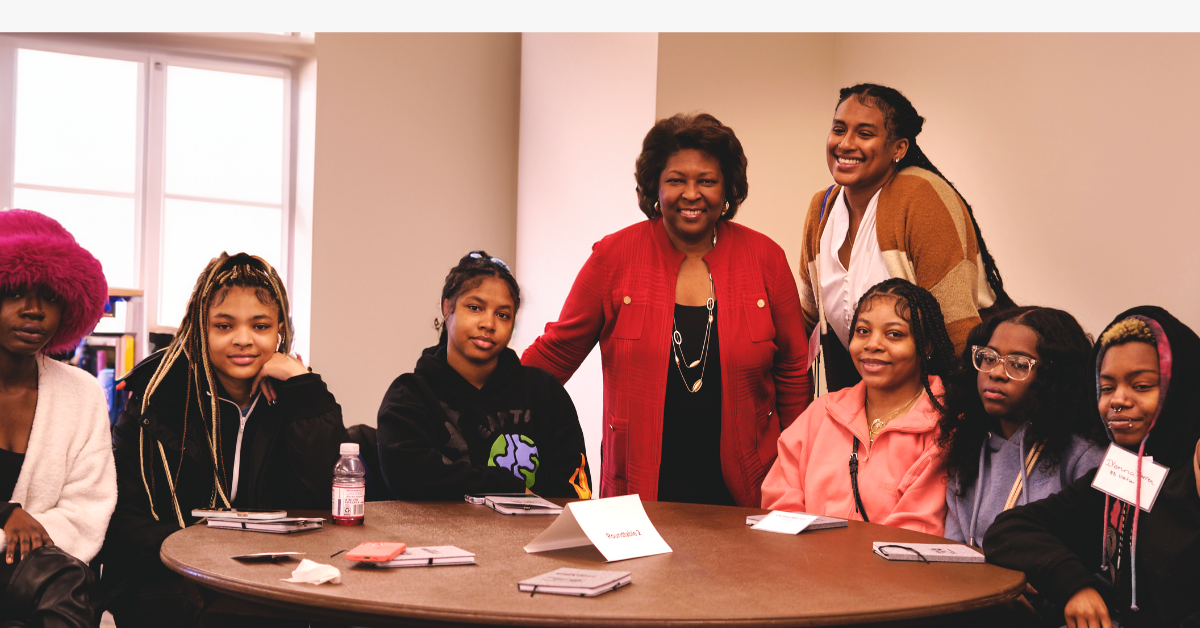What Is Social Empowerment? Empowerment Definition & Theory | United Way NCA
May 24, 2022

Social Empowerment: Definition & Theory
What Is Social Empowerment?
Social empowerment is the process of building the autonomy, power, confidence and other necessary means to enact change and pave the way for a better future. Social empowerment takes place at both the individual and the collective level. For an individual, social empowerment could look like gaining the inner and outer resources to make personal choices, such as what to eat, where to live and other decisions that allow us to control our environment and way of life.
On a collective level, social empowerment looks like organizations and institutions that help marginalized groups of people gain the resources to be empowered, such as material assets, good health, education, social belonging, self-esteem, self-confidence and economic opportunity. The goal is to give people who lack access to these resources a sense of identity, community and well-being so they can thrive and to eliminate systems that keep them without necessary resources and perpetuate marginalization.
Types of Empowerment
Empowerment can be categorized into various types based on the context and the areas in which it is applied. Here are some common types of empowerment:
Personal Empowerment
This type of empowerment focuses on enhancing an individual’s self-confidence, self-esteem and sense of personal agency. It involves developing skills, knowledge and attitudes that enable individuals to take control of their lives, make informed decisions and overcome challenges.
Economic Empowerment
Economic empowerment focuses on improving the economic status and financial independence of individuals or communities. It includes providing access to resources, training and opportunities to create sustainable livelihoods, build assets and improve economic well-being.
Political Empowerment
Political empowerment aims to increase the influence and participation of individuals or groups in political processes and decision-making. This can involve promoting civic engagement, advocating for political representation and fostering awareness of political rights and responsibilities.
Organizational Empowerment
Organizational empowerment involves creating a supportive and inclusive environment within institutions, businesses or organizations. It includes promoting transparent communication, participatory decision-making and providing opportunities for skill development and growth.
Community Empowerment
Community empowerment focuses on building the capacity of communities to identify and address their own needs and challenges. It involves fostering a sense of collective responsibility, encouraging active citizenship and supporting community-driven initiatives.
Gender Empowerment
Gender empowerment seeks to address gender inequalities and promote gender equality. It includes efforts to challenge traditional gender roles, improve access to education and healthcare for all genders and advocate for equal opportunities and rights.
Environmental Empowerment
This type of empowerment centers on fostering a sense of responsibility and stewardship towards the environment. It involves promoting sustainable practices, environmental education and empowering individuals and communities to participate in environmental conservation efforts.
Digital Empowerment
With the increasing importance of technology and the digital world, digital empowerment focuses on providing access to digital resources, digital literacy and skills to bridge the digital divide and leverage technology for personal and collective development.
Social Empowerment
Social empowerment aims to improve the social status and well-being of individuals or marginalized groups within society. It involves promoting social inclusion, equal rights and opportunities, as well as challenging social norms and prejudices that perpetuate discrimination and exclusion.
It’s essential to recognize that these types of empowerment are interconnected and often overlap. For example, economic empowerment can lead to improved social status and social empowerment can influence political engagement. The various types of empowerment often work together to create positive and transformative change in individuals and communities.
Who Benefits From Social Empowerment?
In general, many who identify as part of a group that is largely marginalized can benefit from social empowerment, but everyone benefits when society improves for all groups of people. Social empowerment efforts are most often directed toward advocacy for BIPOC, women, the LGBTQIA+ community, people with disabilities and those living in poverty. The most marginalized members of these groups tend to lack access to basic needs, health care, education and more. Social workers and others who aim to provide empowerment to marginalized individuals and communities strive to instill certain skills, education, resources and community engagement in these groups so they can thrive.
How Can You Contribute to Social Empowerment?
The gateway to contributing to socially empowering others is to first be able to recognize what’s blocking these groups from thriving. In social work, these blockages are divided into two categories: direct power blocks and indirect power blocks.
Direct power blocks are the systems and structures that prevent people from achieving important goals, such as better employment conditions, higher education or safe housing. Individuals and communities are directly blocked from empowerment when they don’t have equal access to quality schools, fair lending practices in housing or ethical treatment in the workplace, to name a few. To help dismantle these direct power blocks, we can work to cultivate awareness, as well as provide ways to take action against mistreatment and advocate for policy reforms and corrective laws.
Indirect power blocks are more challenging to tackle. These indirect blocks are the result of internalized oppression. Groups with personal and historical experiences of widespread mistreatment often absorb negative messaging about their worth. They internalize narratives about who they are, what they can achieve, the options they have and what kind of quality of life they are able to live, and then those narratives are passed down through generations. These blocks are deeply ingrained and often require therapeutic interventions, such as trauma-focused cognitive behavioral therapy, to help individuals shift their mindset.
What are the 4 Stages of Social Empowerment?
Social empowerment involves a process through which individuals or groups gain power, agency and inclusion within society. The stages of social empowerment can be described as follows:
1. Awareness and Recognition
The first stage of social empowerment involves individuals or groups becoming aware of their social status, inequalities and the factors contributing to their marginalization or exclusion. This includes recognizing societal norms, prejudices and systemic barriers that limit their opportunities and influence.
2. Building Social Capital
In this stage, individuals or groups work on building social capital, which refers to the networks, relationships and connections that facilitate their integration and participation within society. Building social capital involves forming alliances, engaging in social networks and collaborating with others to address common issues and challenges.
3. Developing Agency and Voice
Empowerment requires individuals to have a sense of agency, the belief in their ability to act and influence outcomes. This stage focuses on developing the confidence, skills and knowledge necessary for individuals or groups to voice their concerns, advocate for their rights and actively participate in decision-making processes.
4. Collective Action and Social Change
The final stage of social empowerment involves taking collective action to bring about positive social change. This can include participating in social movements, advocating for policy changes or engaging in community-based initiatives aimed at dismantling oppressive structures and promoting inclusivity, equality and social justice.
It’s important to note that the process of social empowerment is not necessarily linear and individuals or groups may move back and forth between these stages as they encounter new challenges or opportunities. Additionally, the stages of social empowerment can vary depending on the specific context and the issues being addressed. The ultimate goal of social empowerment is to enable individuals and communities to overcome social inequalities, participate fully in society and contribute to the well-being of all members of the community.
What Is Empowerment Theory in Social Work?
Empowerment theory in social work uses intervention methods to help guide people toward building autonomy and control in their lives. This theory recognizes that oppression is a primary contributor to disempowerment, which is experienced across a number of marginalized groups. Empowerment theory seeks to empower individuals and communities to gain personal, interpersonal and political power to better their lives. This work also strives to challenge systems that hinder these groups from meeting their needs.
How Does Empowerment Theory Social Work Help Individuals and Communities?
Implementing empowerment theory requires social workers and advocates to thoroughly understand marginalized groups and the systems, policies and practices that deter their success. They must also consider a range of perspectives and be able to ask critical questions.
Those who put empowerment theory to work tend to use this five-step framework to help marginalized groups and their allies solve problems:
- Identify problems
- Define strengths
- Set goals
- Implement interventions
- Evaluate success on a collaborative level
Pillars of Empowerment Theory
To better understand how empowerment theory is used to help people unravel social barriers, looking at how social workers and advocates help individuals build awareness is key. The empowerment approach works to help develop awareness in the following areas.
- Self-Efficacy: To change their outer world, individuals must begin with the belief that this is even possible. This requires challenging indirect power blocks and limiting beliefs around the positive changes that can occur. In this stage, social workers help explore these beliefs, how they began and how to change them.
- Critical Consciousness: An awareness of the systems at play is also necessary. When individuals understand the social, economic and political realities that got them where they are and continue to keep them there, they then can see clearly that their challenges are not random or entirely their fault, but work to problem-solve and dismantle these systems. This awareness also inspires groups to share and problem-solve together regarding limitations they collectively face.
- Tool Development: After awareness comes intervention and putting that awareness into action to heal and grow at the micro and macrolevels. This looks like therapy, case management, self-advocacy, political advocacy, program development and other means of working to establish access to resources.
Conclusion
The resources and skills developed through social empowerment methods can greatly improve the lives of individuals and entire communities. If you or someone you know is in need of social empowerment or if you would like to work with organizations dedicated to social empowerment, United Way of the National Capital Area can point you toward opportunities.
Learn about United Way NCA’s health, education and economic opportunity programs, find Financial Empowerment Centers near you or read more on related social concepts such as social equity and equity and social justice.


